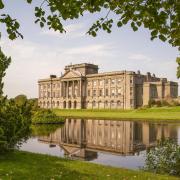James balme digs into Middlewich’s Roman past
Middlewich has a long history of salt production. The town lying at the confluence of the rivers Dane and Croco, was founded by the Romans who named it Salinae because of the rich salt deposits. But even before the arrival of the Romans, the Celtic Cornovii tribe was extracting salt from local brine springs.
The locality became one of the major salt sites during Roman times and activity centred on the township of Kinderton just a quarter of a mile north of the church of St Michael and All Angels. One of the most important Roman artefacts was unearthed during house building on King Street in 1939 when a leaf of a bronze discharge diploma issued in 105 AD was discovered. The diploma awarded to a Roman soldier allowed him to retire from the army and receive Roman citizenship. It is highly likely he would have settled in Middlewich.
During the Roman occupation in around 70 AD, an auxiliary regimental fort was built in what is now the town centre in an area known as Harbutt's Field. The Romans moved northward from here in search of the lowest crossing point of the River Mersey, which they found at Wilderspool in Warrington. By now the new Roman road, today known as King Street, had become the main road that headed straight for the Mersey at Warrington. Roman soldiers would have been a regular sight for the people of Middlewich from this time onwards as they pushed north. It is thought the invading army left the area around 132 AD and at this time the growth and construction of civilian saltworks took place. By the eighth century AD much of the former Roman settlement in the King Street area had been abandoned and over following centuries much of the original pre-cut building stone was reused for new buildings in the town.

In 2001, the first Roman festival was held on Harbutt's field off King Street. The Roman Middlewich Project was born thanks to generous financial support from the Heritage Lottery Fund. With local community excavations taking place to uncover more evidence of Roman occupation of the town as well as a book entitled Roman Middlewich – A Story of Roman and Briton in Mid-Cheshire, written by eminent archaeologist Tim Strickland, the story of the rich Roman past of Middlewich was finally being told. The creation of a Roman trail in the town has helped bring to life the Roman history of Middlewich, as have the various history documentaries filmed during many of the Roman festivals that took place over a 10-year period at Harbutt's Field and are still available to view today.
Middlewich also has a rich history associated with the Normans and in 2005 the Norman Middlewich Project saw local people trained as town guides, as well as contributions from the children of the town and the creation of the Norman Middlewich Tapestry. A community archaeological excavation was held involving g participation of people of all ages.
The culmination of this project came in September 2005 when the first Norman Middlewich festival was held with re-enactments, displays and history events allowing visitors to relive the era of the Norman Conquest.
Today, Middlewich continues to highlight and promote its heritage via the Middlewich Heritage Trust. With many local projects that look further at the history of the town, the trust actively encourages residents and anyone with an interest in Middlewich to become actively involved in events and activities that are held regularly in the area. The aim of the trust is to preserve and promote of the heritage of Middlewich.
My film, The Roman Middlewich Festival 2011, can be viewed for free with many other local history films by visiting my channel, youtube.com/@Tvpresenter4history.
Things to look out for
The site of the Roman fort on Harbutt's Field, King Street
Visit the Roman Trail starting at Middlewich Library
Get involved with Middlewich history at middlewich-heritage.org.uk



























